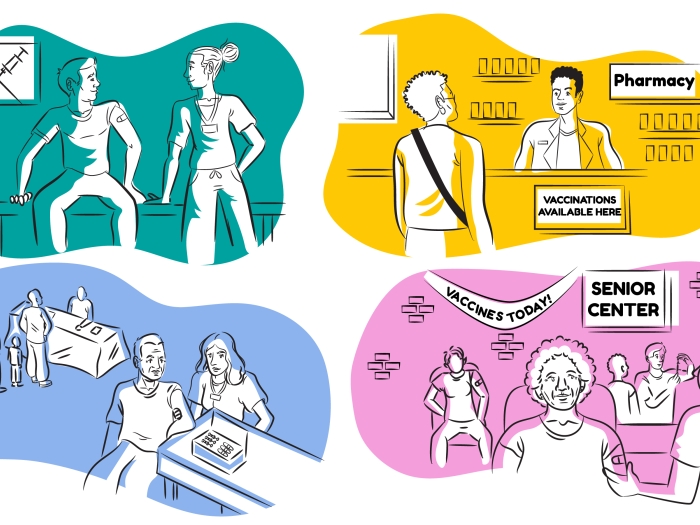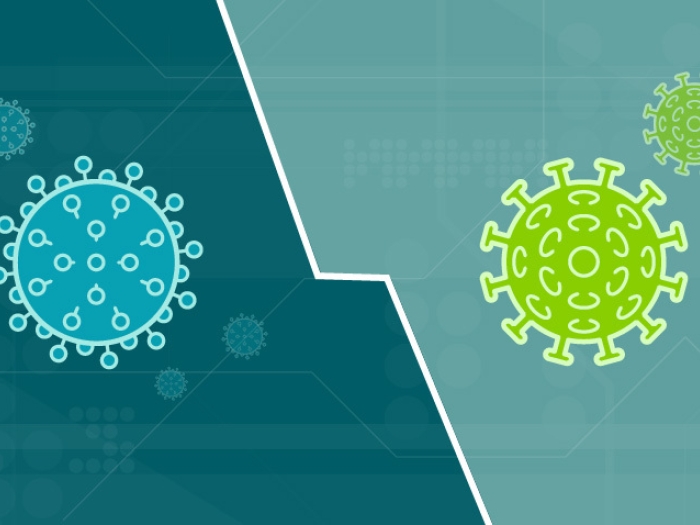A quick guide to volunteering to help researchers understand the virus, the disease and its effects on people and society
4:15 PM
Author |

Editor's note: Information on the COVID-19 crisis is constantly changing. For the latest numbers and updates, keep checking the CDC's website. For the most up-to-date information from Michigan Medicine, visit the hospital's Coronavirus (COVID-19) webpage.
Interested in a COVID-19 clinical trial? Health research is critical to ending the COVID-19 pandemic. Our researchers are hard at work to find vaccines and other ways to potentially prevent and treat the disease and need your help. Sign up to be considered for a clinical trial at Michigan Medicine.
Everyone wants COVID-19 to go away. We want it to stop making our friends and relatives sick. To stop killing thousands of Americans a week. To stop making us stay home, stay six feet apart, wear masks, miss work or school, and avoid people and activities we love.
We want tests, treatments and vaccines that work. We want help for those who are slowly recovering. And we need to prevent anything like this from ever happening again.
LISTEN UP: Add the new Michigan Medicine News Break to your Alexa-enabled device, or subscribe to our daily updates on iTunes, Google Play and Stitcher.
All of us can play a role in getting there – by helping the researchers who are searching for those answers as fast as they can.
Scientists are working at top speed to understand the new coronavirus, test ways of preventing or treating COVID-19, and measure the pandemic's effects on people and society.
To do these studies, they need help from people who have already gotten sick, and from people who have the highest risk of catching the virus. They need help from people whose health puts them at risk of serious COVID-19 illness, and from healthy people at low risk.
If you have had COVID-19:
You can teach science a lot about this new virus. In addition to the suggestions below, consider donating a sample of blood to a university or teaching hospital that is collecting it for research. Here's information on how to do so at the University of Michigan.
Ways to help COVID-19 researchers:
Join a registry:
Think of it as online dating, but for scientific research instead of matchmaking.
A registry is a secure list of people who are willing to let researchers contact them when a study needs someone like them. Even if a researcher invites you join their study, there's no obligation to take part.
Before COVID-19 struck, research registries made it easier for scientists to connect with people who had the health condition they were studying.
Now, the pandemic makes it urgent to grow these registries so that scientists can reach people quickly when a new study starts.
-
University of Michigan Health Research Registry: http://umhealthresearch.org – Nearly 50,000 people have already joined it. You don't have to be a patient at a U-M hospital or clinic to join – community members from Michigan and beyond are invited. If you've already had COVID-19, you can indicate this when you sign up.
-
HEROES Registry for health care workers: https://heroesresearch.org/ This registry focuses on people who work in any health care setting, no matter what job they do. It launched because of the special risks that health care workers face during the COVID-19 pandemic.
-
Registries at the hospital or health system where you get care: If your doctors are affiliated with a major health system, you may be asked to give permission for researchers to contact you. Or you may be able to sign up for a registry.
Join a symptom tracking study:
Even if you haven't had any symptoms of COVID-19, you can help researchers track the nationwide spread of the virus through crowdsourcing. It might take just a minute a day or week to take part, and tell the researchers if you're experiencing symptoms.
This could be especially useful to spot early signs of "second waves" of cases as states reopen their businesses and recreational activities.
-
The COVID Near You study, started by researchers at Harvard University, uses text messaging.
-
The COVID Symptom Study, from Massachusetts General Hospital and Imperial College London, uses an app originally developed for a huge national study of nurses.
-
The National Daily Health Survey, from Stanford University, sends an email to prompt people to report how they're feeling each day.
Join an antibody test study:
People who had symptoms of COVID-19 but didn't get tested while they were sick are now able to get antibody testing to detect if they had the disease. These tests must be ordered by doctor's offices.
MORE FROM MICHIGAN: Sign up for our weekly newsletter
But researchers also want to see what portion of the general public has antibodies to COVID-19, even if they haven't had symptoms.
The National Institutes of Health is looking for people with no known history of COVID-19 symptoms, who are willing to do an at-home blood draw that captures the equivalent of a couple of drops of blood.
Take an online survey:
Without leaving home, you can help University of Michigan teams understand how you are being affected by the COVID-19 pandemic by taking a survey. There's a general survey that any adult can take, and also special surveys for people over age 55, people who are caregivers for people over 60, and people with asthma.
If you or your child have a rare disease (like the ones on the list here) you can complete a survey from the national Rare Diseases Clinical Research Network, to help researchers understand the effects of COVID-19 and related issues. You can take it anonymously or give permission for researchers to contact you again.
Also, the National Institute of Mental Health need adults to take part in ongoing surveys about the pandemic's impact on their state of mind.
Find a clinical trial:
All new treatments, devices, and prevention strategies — including vaccines — must be tested in studies called clinical trials. These studies are designed to test if the new option is safe and effective enough for widespread use.
Many trials right now are focusing on testing options for people who have been hospitalized for COVID-19. Some of these trials offer access to experimental therapies that might not be available any other way.
If you know someone who currently has a severe case of COVID-19, you can look at which hospitals in their areas are taking part in clinical trials via this map created by the federal government.
As time goes on, more clinical trials are opening up to test prevention strategies. Joining a registry is one way to hear about studies that need people like you; checking the websites of http://www.clinicaltrials.gov and large hospitals or university medical centers is another.

Explore a variety of health care news & stories by visiting the Health Lab home page for more articles.

Department of Communication at Michigan Medicine
Want top health & research news weekly? Sign up for Health Lab’s newsletters today!





